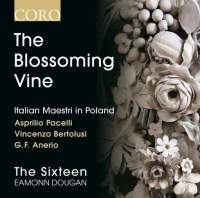Texte paru dans: / Appeared in:
*

GRAMOPHONE (08/2014)
Pour s'abonner /
Subscription information
Coro
COR16123

Code-barres / Barcode
: 0828021612329
Consultez toutes les évaluations recensées pour ce cd
~~~~ Reach all the evaluations located for this CD
Reviewer:
Alexandra
Coghlan
The first disc in The Sixteen’s Polish Baroque series explored the mid 17th-century music of Bartłomiej Pe˛kiel (9/13). The second takes us a little further back in time to Pękiel’s Italian predecessors at the court of King Sigismund III, whose influence would so fundamentally shape the nation’s musical development.
It is likely that both Asprilio Pacelli and Giovanni Anerio studied with Palestrina, and his is very much the sound world we find ourselves in here, one of postTridentine directness and poise. Anerio’s double-choir Missa Pulchra es forms the backbone of the disc. This attractive if occasionally rather anonymous setting has its highlight in an unusually striking Credo which climaxes in a reduced-forces ‘Crucifixus’ section of exquisite loveliness.
Hailing from
Venice, Vincenzo Bertolusi contributes two contrasting motets: the declamatory
and dancing Regina caeli and the gauzy, long-limbed imitation of Ego flos campi.
But it is Pacelli who is responsible for the disc’s treasure, the nine-minute
Dum esset rex. Here, single voices replace thicker choral textures, with forces
divided into five four-voice choirs. The result blends monumental architecture
and athletic polychoral energy with a sensuousness born of the text, lavishing
the poet’s ‘beloved’ with every possible musical caress.
All the disc’s motets are Marian in theme, whether explicitly or in the fragrant
metaphors of the Song of Songs. This might be the root cause of a certain
sameness of mood throughout. The performances are beautifully balanced and
blended but there’s a soft-focus gloss to it all that, while it suits these
delicate texts, would occasionally benefit from the contrast of more bracing
textural clarity and rhythmic impetus.
Fermer la fenêtre/Close window
Cliquez l'un ou l'autre
bouton pour découvrir bien d'autres critiques de CD
Click either button for many other reviews


